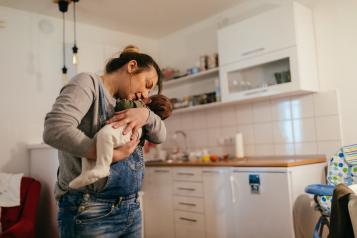Mental health and the journey to parenthood: Helen P’s story

Difficulties conceiving
“I had IVF with a sperm donor because I was worried I’d have early menopause, as my mum did. It was unsuccessful and I was depressed after that.
I met someone and became pregnant unexpectedly. I’m not sure if this all affected my state of mind, as I was so surprised. I felt like I had been diagnosed as infertile, so I found it hard after my baby was born to fit in at playgroups etc.”
When feeding isn’t going well, nobody says you can’t breastfeed. Nobody checks you and says that it just isn’t going to work out for you. Nobody ever talks about just not doing it.
Troubles breastfeeding
“The start was very hard. I found breastfeeding very difficult. I was sent home without having established feeding, I think they thought I understood more than I did. I ended up back in hospital because my baby was losing weight. I worked with a lactation specialist and used a mixture of formula and pumped breast milk to feed my baby.
When I heard people talk about feeling distressed about not being able to breastfeed I didn’t think I would feel that way, but I did.
I hadn’t anticipated formula feeding. I felt anxious about buying a steriliser without reading lots of reviews first.
The education you get about breastfeeding beforehand is ‘If everything goes great, this is what will happen’. I heard your milk comes in after a certain amount of days, but I didn’t realise you had to keep trying even if nothing was coming out, as that stimulates more milk.
When feeding isn’t going well, nobody says you can’t breastfeed. Nobody checks you and says that it just isn’t going to work out for you. Nobody ever talks about just not doing it.
My son had a tongue tie so he couldn’t latch. I felt guilty for a long time afterwards thinking I shouldn’t have given up.”
Warning signs of postnatal depression
“After my son was born I had what felt like palpitations, episodes of my heart racing, and feeling very anxious.
My doctor said it sounded like PND, but I felt strongly that it was something physical happening to me.
If I put my baby down in his bouncy chair at home, I’d always put it in the middle of the room in case the cupboards collapsed on him.
I ended up going back to the doctors and saying that I thought they might be right about PND.
I was given medication. I was also given a leaflet for therapy, but they wanted to give me drugs as PND can get worse and there can be a wait for treatment. The drugs helped. If I’d wanted therapy I would have had to refer myself. They didn’t probe me about the extent of my thoughts.
After a few months I felt more in control of the situation. I was still anxious but I wasn’t sure if I had always been like that. We reduced my tablets.”
Treatment without the human touch
“A few months later, I had a relapse. I had an episode where I was walking across a bridge with my son and I felt like I wasn’t able to assess danger properly. I felt like I should let him explore and I shouldn’t just cling onto him all the time, but I was also scared that he could fall. I got into a panic not knowing what was the right thing to do and what was genuine danger.
That time when I saw the doctor and asked for medication, she said what happened could just be a symptom of motherhood.
I referred myself for psychological support. I had a phone consultation where I was really sobbing and they offered me an online CBT course.
The course made me feel more upset than if I’d had no help at all. It felt insulting to only be offered a computer course and not to get to see someone. Having been a nurse myself, I know there’s a benefit to seeing another human being.
I did the CBT for a short time, and was then told I could wait to have CBT over the phone.
By the time I’d done the online course and waited to be assessed again, my period of feeling very distressed had passed by, so I didn’t feel more support would have been helpful anyway. The drugs had started to work.
I feel a lot better now. I haven’t tried to come off the tablets again yet so there’s a bit of fear in me about that. I’m waiting until life feels less full of hurdles before I try.”
Have you been affected by this story?
If the content of this story causes you to think of anything that has happened to you or someone you know and you feel upset, worried or uncomfortable, please see the Maternal Mental Health Alliance's support page for a list of services who may be able to help.


